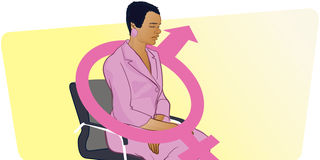Law seeking to recognise intersex as third gender drafted

The Intersex Persons Bill, 2023 proposes to add the marker to the existing 'male' and 'female' sexes, as part of the ongoing campaign to recognise the group.
A Bill that seeks to introduce intersex as a third gender marker on official government documents is now the subject of public scrutiny, at a time when the group is fighting for recognition and against stigma and discrimination.
The Intersex Persons Bill, 2023 proposes to add the marker to the existing 'male' and 'female' sexes, as part of the ongoing campaign to recognise the group.
The Bill has been drafted by the Kenya National Commission on Human Rights (KNCHR), with commissioner Dennis Wamalwa saying they expect to send it to the National Assembly in September this year for tabling and debate.
Mr Wamalwa, who was born intersex before undergoing a series of medical operations to retain the dominant male gender, said the group would be referred to by the letter "I" on official government documents should the Bill become law.
At present, people who are intersex are forced to choose male or female, and they feel that this adds to the stigma they suffer due to lack of recognition.
The documents targeted include birth announcements, birth certificates, passports and identity cards.
Others are academic certificates, with Mr Wamalwa saying the proposed law comes after the first census of intersex people in 2019 showed that Kenya has a population of 1,524 people who have characteristics of both male and female sexes.
Speaking in Vihiga County during a forum organised by KNCHR to sensitise the public on the Bill and gather more views, Mr Wamalwa said there were more intersex people who shied away from identifying themselves during the census.
Article 5(1) of the Bill states: "Subject to the law relating to the registration of births and deaths, an intersex child shall be entitled at birth to be issued with a written confirmation of birth or an official birth certificate stating that the child is intersex."
Sub-article two adds that: "The registration shall include the name and date of birth of the child, the name and date of birth of both parents and the sex of the child as male, female or intersex."
Change the sex marker
And well aware that intersex persons may undergo medical operations during their lifetime to retain the dominant sex, the Bill states in Article 6(2) that such a person may at any time apply to the Registrar to change the sex marker.
The change, the Bill says, can be from male to intersex, female to intersex, or intersex to either male or female.
Mr Wamalwa said his surgery to change from intersex to male cost Sh57 million and he receives two injections every month to keep the dominant sex active.
"This (injection) is what helped me grow these beards that you see," Mr Wamalwa told journalists on the sidelines of the public participation forum in Mbale town.
Article 7(1) of the Bill reads: "An intersex person may at any time apply to the registrar to correct any particulars in the national identity document."
Sub-article two states that such an application must be made in writing, specifying the particulars to be corrected.
The draft law also seeks to end the stigma and discrimination against intersex people by upholding their rights.
Article 8 of the Bill states that the government shall take steps to ensure the full realisation of the human rights and fundamental freedoms of intersex persons through the development, review and implementation of relevant laws and programmes.
The Bill proposes a fine of Sh100,000 and/or imprisonment for up to six months for any person who subjects an intersex person to any form of harmful practice.
The fine, according to the Bill, will also apply to any person who aids, abets, permits or encourages another person to subject an intersex person to any harmful practice.





